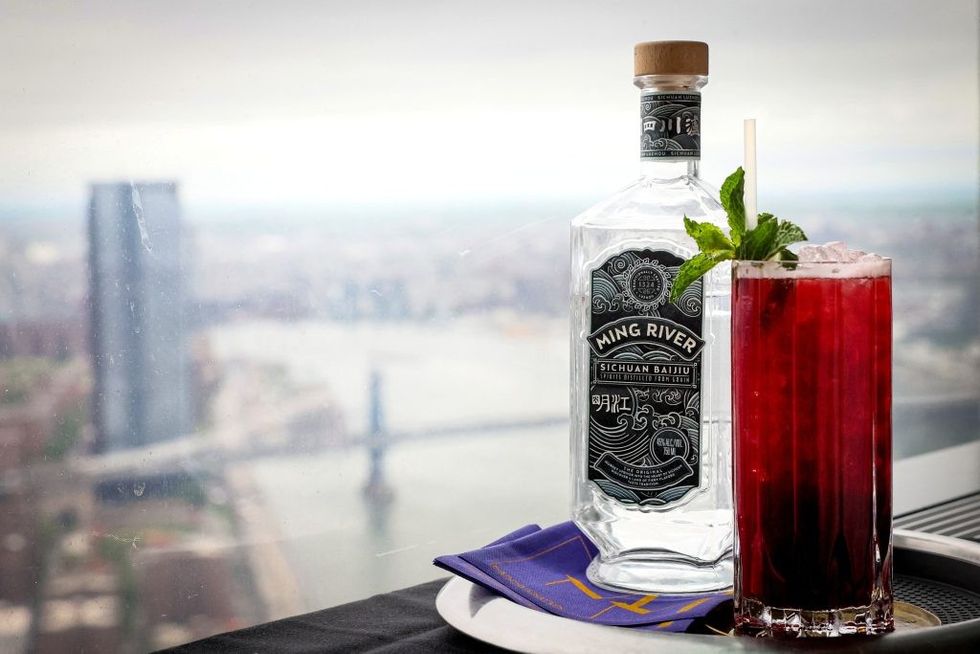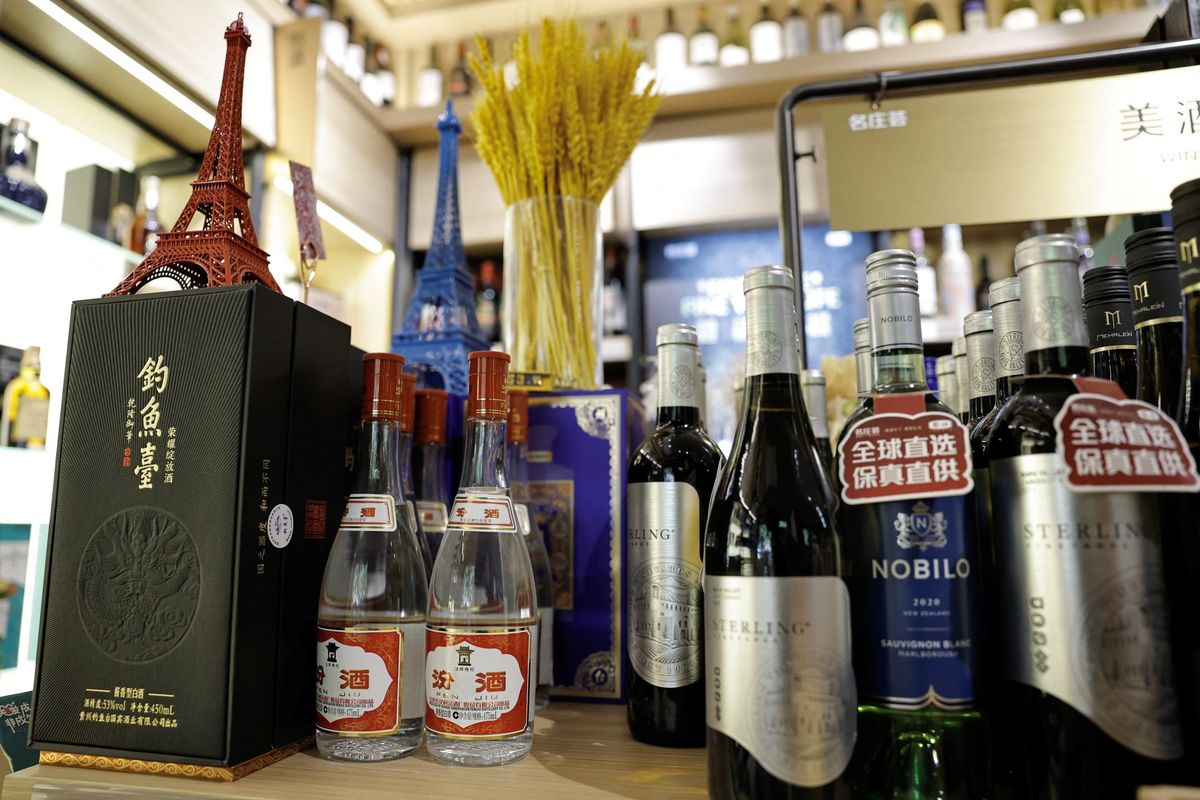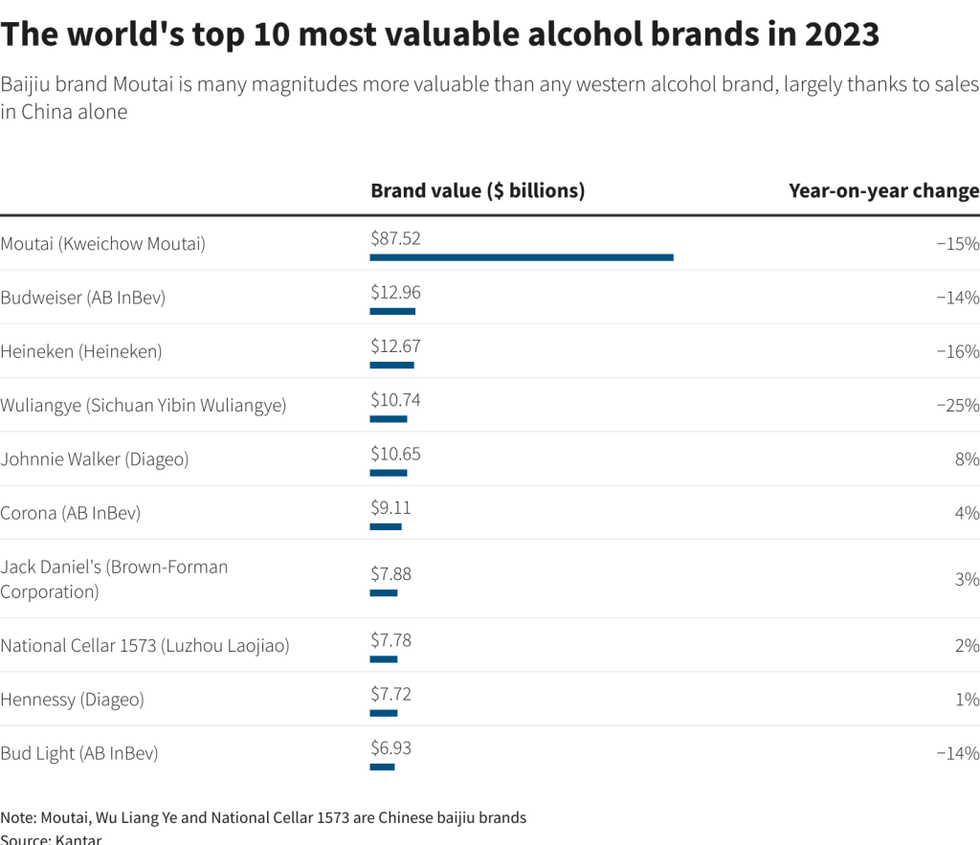Baijiu, a fiery white spirit, is little known outside of China
Makers of the Chinese liquor baijiu are reformulating the fiery grain liquid to appeal to a wider client base, including cocktail drinkers in New York, Los Angeles and London, as sales at home slow.
While sales in China are still rising, top baijiu makers like Kweichow Moutai face far slower growth than in the past as younger generations increasingly opt for alternatives to the country's national liquor.
Now, in a bid to find new pockets of growth, some major makers of the colourless liquor are starting to pitch it to Western consumers outside of China for the first time.
Baijiu is little known in the US, UK and Europe, however, so many Western drinkers would have to learn to like the flavour.
Baijiu, which translates as 'white alcohol', usually has between 40% and 60% alcohol content. It is generally distilled from sorghum, although wheat, barley, millet or glutinous rice are also used.
Its taste varies depending on the region or way it is produced. Some say it is similar to vodka. Another well-known type is likened to soy sauce.

Chinese companies' moves to push baijiu outside of China come as Western drinks groups like Pernod Ricard and Diageo muscle in on Chinese liquor makers' turf, tempting China's twenty and thirty somethings with Irish and Scotch whiskies in particular.
Shede Spirits, based in China's Sichuan province, sells two baijiu brands in China and to Chinese consumers globally. Its more expensive brand, Shede, goes for up to $1,000 (£788) per bottle.
The company, controlled by Chinese conglomerate Fosun International, said it is holding tasting sessions to identify tweaks to the flavour of the Shede brand, in hopes of appealing to non-Chinese drinkers.
The participants will come from the US, Australia, Britain and other European countries, as well as places like Japan and Singapore.
"We figured out that the foreigners, their taste is finer," said Zhu Yingcai, Shede's head of sales and marketing, adding that compared to vodka baijiu can be "heavy and very thick".
Over time, Shede believes Westerners will come to enjoy baijiu, and it could steal market share from other spirits, he said.
The company will sell the international version of its Shede baijiu for around $150 from September in countries in parts of Europe, the US and Japan, according to Zhu.
In comparison, online alcohol retailers based in New York sell 750ml bottles of Diageo's Johnnie Walker Blue Label whisky, the most expensive version of the brand, for $200 or more on their websites.
'Extremely aromatic'
Rival baijiu maker Sichuan Yibin Wuliangye Group, headquartered in Yibin city in Sichuan, has teamed up with Italian drinks group Campari in a partnership aimed at promoting both companies' brands in China and internationally.
The partnership, announced in November, is still in its "very early stages", said Campari, whose brands include the Aperol aperitif, Espolon tequila and Wild Turkey whiskey. Campari's sales of its own brands in China are currently relatively small.
The companies will work together on marketing and brand promotion and co-create products, Campari said.
They have already developed a twist on the negroni cocktail, usually made with gin, using a "special blend" of Wuliangye's baijiu. They launched this cocktail in Shanghai in September and dubbed it the "Wugroni".
Wuliangye did not respond to a request for comment.
China is the world's largest alcohol market, largely thanks to baijiu sales. The country's liquor makers sold roughly $167 billion of baijiu in China alone in 2023, estimates research firm Euromonitor. It said it does not monitor baijiu sales outside of China, which remain small.
Zhu said Shede's international sales stood at around $5 million in 2023, but it aims to increase them to $100 million within 5-10 years.
To get there, it plans marketing on platforms like TikTok, via influencers in the US and Europe and eventually sports sponsorships, perhaps even of major events like the Olympics, Zhu said.
At the bar of the Manhatta restaurant in New York, customers can enjoy a "Berry Me NYC" for $21. It contains a small amount of baijiu, alongside Pimms and shiraz.
Patrick Smith, senior beverage manager, said baijiu is "extremely aromatic". When opening a box of baijiu bottles, the smell hits the nose even though they are shrink wrapped, he said.
The cocktail was only recently introduced. But a baijiu-containing predecessor was "in the middle" in terms of popularity versus other cocktails on the menu. Customers who tried them were curious about the flavour, he said.
Manhatta's cocktail uses baijiu from Ming River, a company created by three Westerners in partnership with major Chinese distillery Luzhou Laojiao.
Aiming to develop an international market for the spirit, Ming River sells its baijiu in 15 countries including the US where clients range from bars and restaurants to retailers such as Costco and tourists flocking to Disneyland.
(Reuters)



